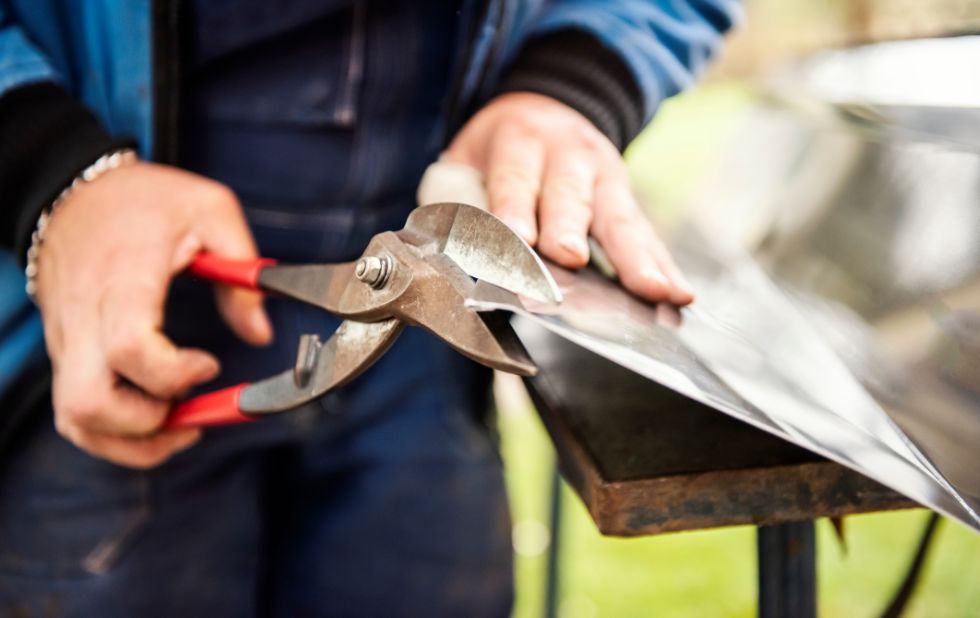Introduction
In the realm of metalworking, sheet metal holds a distinct position due to its versatility and widespread use in various industries. From crafting intricate designs to constructing robust structures, sheet metal plays a pivotal role. To ensure efficiency and precision in a sheet metal workshop, having the right set of tools is indispensable. In this blog post, we will explore the essential tools that every sheet metal workshop should possess, highlighting their functions and significance.
Shears and Snips
At the heart of any sheet metal workshop, shears and snips take center stage. These tools are designed for cutting through sheet metal with precision and ease. Handheld snips, available in straight, left, and right cutting patterns, are perfect for intricate cuts, while electric or pneumatic shears are ideal for larger and straight cuts. Investing in high-quality shears and snips ensures clean and accurate cuts, a fundamental requirement in sheet metal fabrication.
Nibblers
Nibblers are specialized cutting tools that excel in creating complex shapes and patterns in sheet metal. These tools operate by removing small bits of metal, allowing for intricate designs and curved cuts. Nibblers are especially useful when working on projects that demand precision and creativity, making them an indispensable asset in any sheet metal workshop.
Bending Brakes
Bending brakes, also known as press brakes, are essential for shaping sheet metal with accuracy. These tools use a mechanical or hydraulic mechanism to bend the metal to the desired angle. Bending brakes come in various sizes and capacities, catering to a wide range of sheet metal thicknesses. Whether forming simple bends or intricate shapes, a bending brake is crucial for achieving the desired outcomes in sheet metal fabrication.
Roll Forming Machines
For projects that involve long stretches of continuous bends or curves, roll-forming machines are invaluable. These machines feed the sheet metal through a series of rollers, gradually shaping it into the desired form. Roll forming machines are efficient and precise, making them essential for mass production and projects that require consistent shapes over extended lengths.
Welding Equipment
Welding is a fundamental process in sheet metal fabrication, and a well-equipped sheet metal workshop should include various welding tools. MIG, TIG, and stick welders are commonly used for joining sheet metal pieces. Additionally, a selection of welding clamps, gloves, and helmets is essential for ensuring safety and precision during the welding process.
Deburring Tools
After cutting and shaping sheet metal, the edges often need to be smoothed to remove any sharp burrs. Deburring tools, such as files and chamfering tools, are crucial for this task. Smooth edges not only enhance the aesthetic appeal of the finished product but also eliminate potential safety hazards associated with sharp edges.
Sheet Metal Nibblers
Distinct from handheld nibblers, sheet metal nibblers are electric or pneumatic tools designed for cutting sheet metal with minimal distortion. These tools excel in creating clean, precise cuts without causing warping or deformation, making them indispensable in projects where accuracy is paramount.
Scribing Tools
Accurate measurements and markings are fundamental in sheet metal fabrication. Scribing tools, including dividers and scribers, help in marking precise lines on the metal surface. This ensures that cuts, bends, and welds are executed with meticulous accuracy, contributing to the overall quality of the fabricated product.
Sheet Metal Hammers and Dollies
Sheet metal hammers and dollies are essential for shaping and contouring metal surfaces. The hammer is used to strike the metal, while the dolly provides support from the opposite side, helping to create smooth curves and contours. This combination is particularly useful when working on intricate designs and forming three-dimensional shapes.
Safety Equipment
Last but certainly not least, safety should be a top priority in any sheet metal workshop. Safety equipment such as gloves, safety glasses, ear protection, and respiratory masks are essential to protect workers from the inherent hazards of sheet metal fabrication. Additionally, a well-ventilated workspace and proper training on the use of each tool contribute to a safe and productive working environment.
Conclusion
In conclusion, a well-equipped sheet metal workshop requires a comprehensive set of tools to ensure efficiency, precision, and safety. From cutting and shaping to welding and finishing, each tool plays a crucial role in the fabrication process. Investing in high-quality tools not only enhances the quality of the final products but also contributes to the overall productivity and success of the sheet metal workshop. By recognizing the significance of these essential tools and incorporating them into the workspace, sheet metal fabricators can elevate their craft and meet the diverse demands of the industry.


